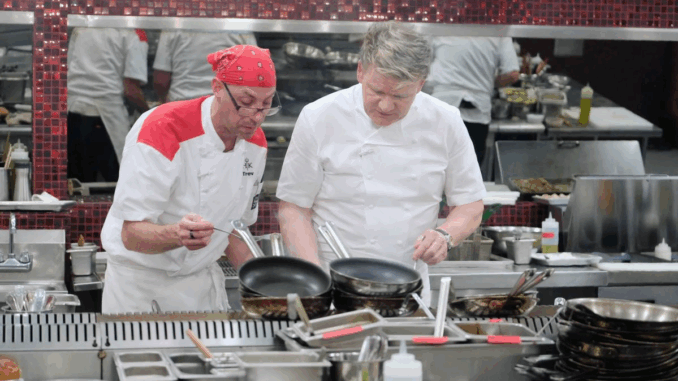
There was a time when watching Gordon Ramsay felt thrilling. His voice was fire, his temper a spectacle, and his presence impossible to ignore. He became a household name not because he was a gentle teacher or a mentor, but because he was the chef who shouted, the chef who humiliated, the chef who made disaster entertaining. But looking back now, and even as I type these words with a knot in my stomach, I can’t shake the feeling that what we mistook for brilliance was actually a kind of damage. Ramsay didn’t just shape reality cooking shows—he poisoned them with a formula that has left scars we can’t wash away.
The blueprint was simple and brutal: take aspiring chefs, throw them into impossible conditions, then break them down under the glare of cameras and the sting of insults. He called them donkeys, idiots, worse. And we laughed, or we gasped, or we leaned closer to the screen. I was guilty of it too. I remember sitting there, bingeing season after season, mesmerized by the chaos, almost addicted to his fury. But in hindsight, I can’t help asking myself—at what cost? Contestants cried on national television, dreams were shredded in front of millions, and humiliation became a form of prime-time entertainment.
Ramsay’s defenders argue that it was tough love, that the kitchen is no place for softness, that only the strongest survive. But that’s exactly the problem. His shows weren’t kitchens; they were arenas. They weren’t about food; they were about conflict. And slowly but surely, the industry followed his lead. Every new cooking competition seemed to copy the same recipe: crank up the tension, raise the stakes, manufacture meltdowns, and let the viewers feast on carnage. Ramsay made cruelty look normal, even necessary. And I can’t help but feel complicit because I watched, I cheered, I consumed it like everyone else.
The influence bled beyond television. Chefs who grew up on Hell’s Kitchen or Kitchen Nightmares began to see abuse as a badge of honor. To scream at subordinates, to belittle apprentices, to crush egos—it was all part of the Ramsay legacy. He turned toxicity into a culture, and the ripple effects hit actual kitchens around the world. I’ve spoken to people in the restaurant industry who told me flat out: Ramsay made their bosses think abuse was leadership. And if that’s his legacy, then it isn’t brilliance—it’s devastation.

I can’t deny that Ramsay is talented. His culinary achievements are real, his empire undeniable. But that’s the paradox that haunts me. With all that skill, with all that knowledge, why did he choose to become entertainment’s tyrant? Why did he decide that screaming was his brand, that humiliation was his gift to the world? Because it worked. Because it made him famous. Because we rewarded it. And so episode after episode, season after season, Gordon Ramsay carved himself into pop culture not as a chef but as a spectacle of rage.
I remember one moment that still sits heavy with me. A contestant on Hell’s Kitchen broke down in tears, and Ramsay, rather than softening, doubled down. The cameras zoomed in, capturing every sob, every crack. The ratings soared. And I remember watching it live, feeling both disgust and excitement. That’s when I realized: this wasn’t just his toxicity. It was ours too. He gave us what we wanted, even if it destroyed the people in front of us.
Today, as reality TV continues to thrive on drama, I see Ramsay’s fingerprints everywhere. Shows about baking, home renovation, even dating—all of them lean into conflict, humiliation, and emotional breakdowns as though it were the only way to keep us watching. And I can’t help but think: Gordon Ramsay opened that door. He normalized cruelty as entertainment. He made suffering a commodity. And maybe, without fully realizing it, we became addicted to it.
If I sound harsh, it’s because I feel betrayed. Betrayed by a man I once admired for his culinary genius, betrayed by a system that turned his temper into ratings gold, betrayed by myself for buying into it. Ramsay wasn’t just a chef on TV. He was the storm that swept through reality television, leaving wreckage in its path. And though he still thrives, though his empire is still standing, I think the damage he caused to the soul of cooking and the spirit of competition will outlast even him.
Because here’s the truth I can’t shake: Gordon Ramsay didn’t just entertain us. He changed us. He made us hungry for conflict, eager for cruelty, numb to empathy. And maybe that’s his greatest recipe of all—one that left reality TV scarred forever.